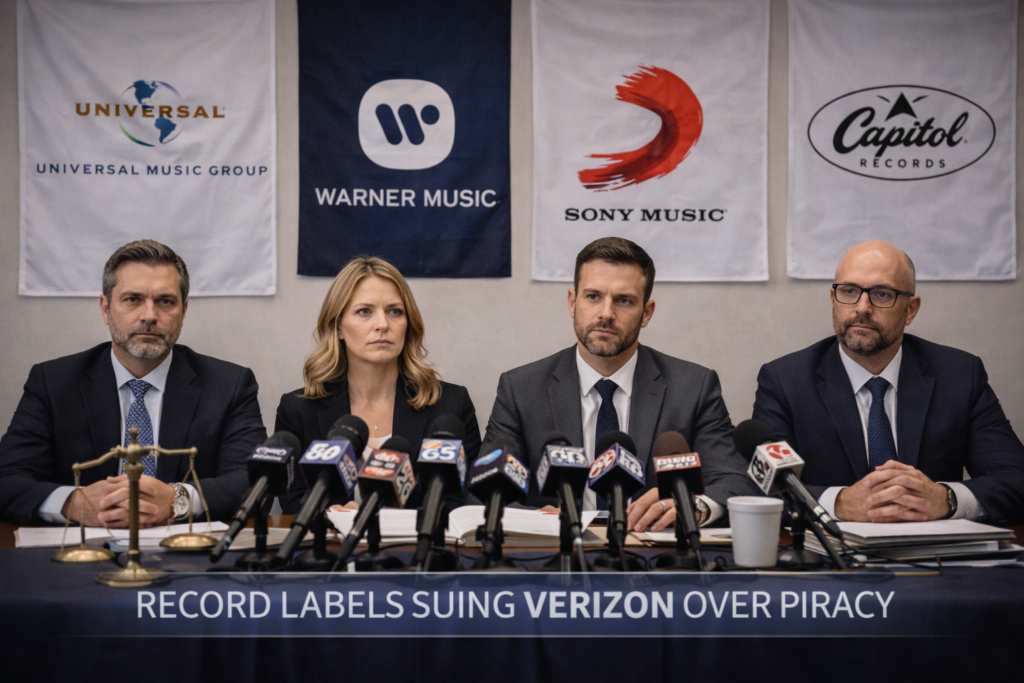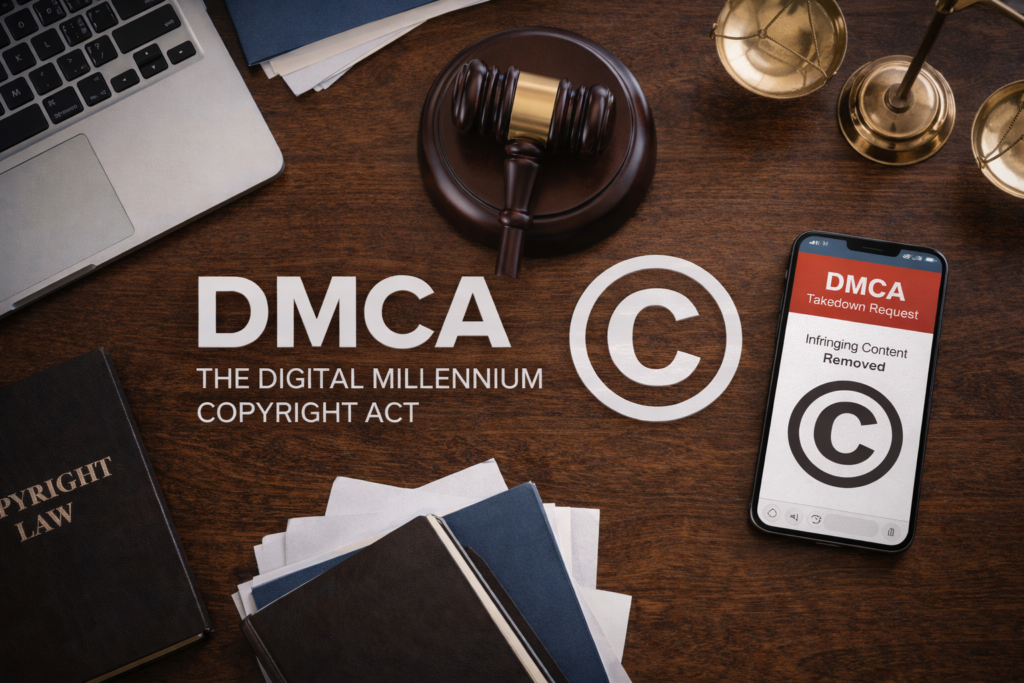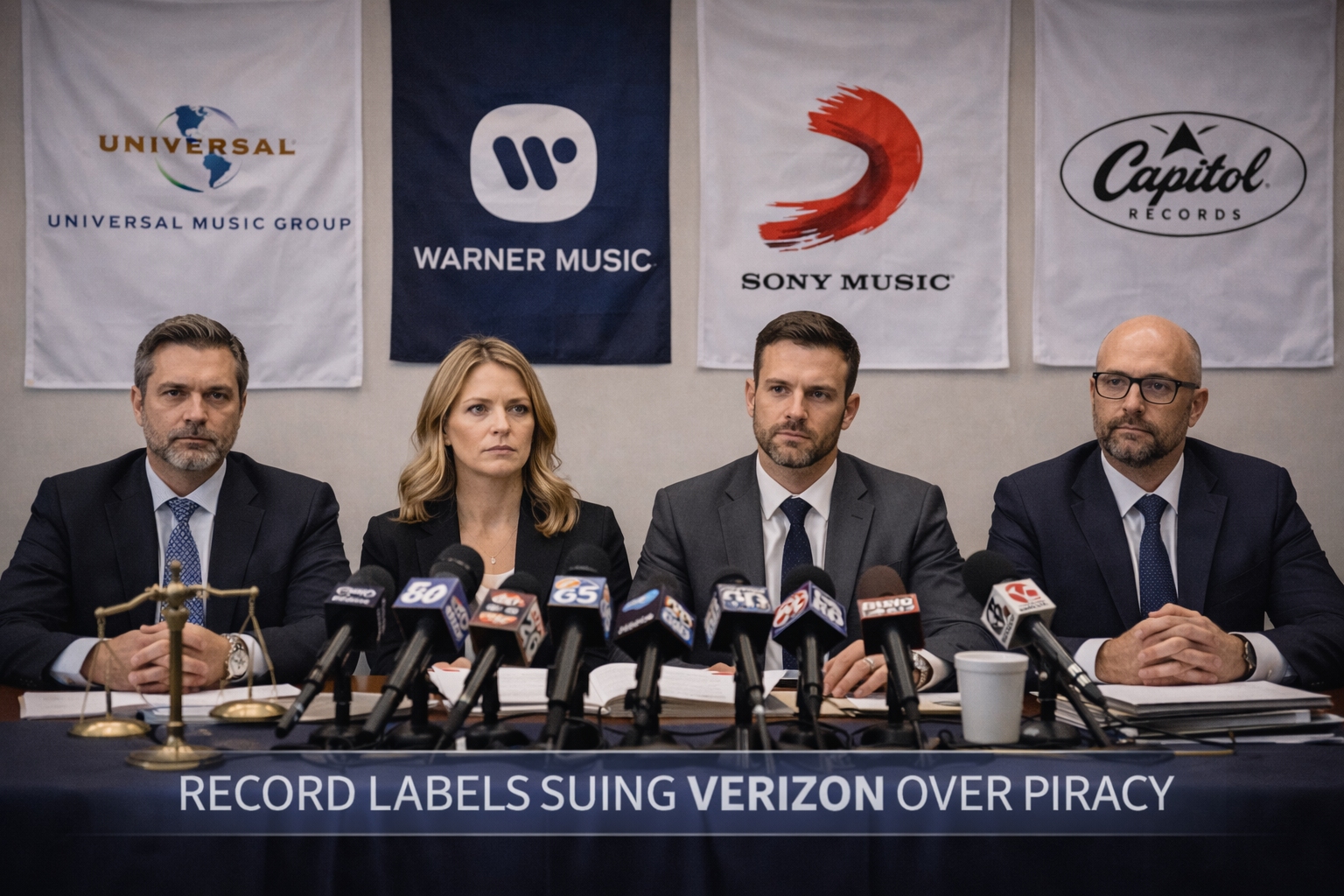Record Labels Sue Verizon Over Piracy
A recent lawsuit against Verizon Communications, Verizon Services, and Cellco Partnership (doing business as Verizon Wireless) has once again thrust digital piracy into the spotlight. Filed by some of the world’s largest recording companies—including Universal Music Group, Warner Music, Sony Music, and Capitol Records—the suit alleges that Verizon knowingly enabled and profited from widespread copyright infringement by tens of thousands of its subscribers. At its core, the case underscores a long-standing and intensifying dispute between content creators and internet service providers over how much responsibility ISPs should bear for policing illegal activity on their networks.

The Allegations Against Verizon
The complaint against Verizon is particularly striking in its accusations. The plaintiffs argue that Verizon, famous for its “Can you hear me now?” advertising campaign, has deliberately ignored the complaints and infringement notices from copyright owners. According to the lawsuit, Verizon has continued to provide high-speed internet services to a large community of online pirates who download and distribute music illegally without payment. Despite receiving hundreds of thousands of copyright infringement notices, Verizon is accused of turning a blind eye to these activities. The complaint points out that thousands of subscribers have received 20 or more notices, more than 500 subscribers received over 100 notices, and one individual received an astonishing 4,450 infringement notices.
Using BitTorrent To Download Music
Since early 2020, the music labels have sent more than 340,000 infringement notices to Verizon, informing the company of the illegal use of BitTorrent to download, copy, and distribute copyrighted content. The plaintiffs claim that Verizon’s failure to act on these notices has resulted in over $130 billion in lost revenue in 2023 alone. The court documents include a comprehensive list of 17,335 songs that the plaintiffs allege Verizon allowed to be illegally distributed. This list features works by high-profile artists such as Prince, Nickelback, Madonna, The Beatles, Led Zeppelin, Stevie Wonder, and Fleetwood Mac, among others, stretching over a 408-page exhibit.
Seeking Compensation for Damages
The plaintiffs are seeking significant financial compensation for these alleged infringements, up to $150,000 per infringement. With over 17,000 songs involved, this amounts to approximately $2.6 billion. The outcome of this lawsuit could have far-reaching implications for ISPs and their policies towards copyright infringement. It raises critical questions about the extent of an ISP’s responsibility to monitor and control user behavior on their networks and whether current legal frameworks are adequate to address the challenges posed by digital piracy.
The DMCA Legislation

The Digital Millennium Copyright Act (DMCA), enacted in 1998, is a pivotal piece of legislation designed to address the challenges posed by digital piracy and the unauthorized use of copyrighted material on the internet. The DMCA primarily aims to protect the rights of copyright holders by establishing legal standards and procedures for managing and enforcing copyright in the digital age.
Protects Internet Providers from Liability
One of the central features of the DMCA is the safe harbor provision, which shields internet service providers (ISPs) from liability for the infringing activities of their users, provided that the ISPs adhere to certain conditions. This protection is contingent upon ISPs acting expeditiously to remove or disable access to infringing material upon receiving proper notification from copyright holders.
Verizon Failed the DMCA Requirements
The lawsuit against Verizon by major music companies such as Universal Music Group, Warner Music, Sony, and Capital Records directly pertains to the DMCA and its safe harbor provisions. The plaintiffs argue that Verizon failed to comply with the DMCA’s requirements, thereby forfeiting its safe harbor protections. According to the lawsuit, Verizon received over 340,000 infringement notices since early 2020, alerting the company to the illegal downloading and distribution of copyrighted music via its network. Despite these notifications, Verizon allegedly continued to provide internet services to known infringers, thereby enabling and profiting from their illegal activities.
There Was No Terminating of Infringers
Under the DMCA, ISPs are required to implement a policy for terminating repeat infringers’ accounts and to act upon receiving takedown notices. However, the plaintiffs claim that Verizon ignored these obligations by not taking adequate measures against subscribers who were repeatedly flagged for copyright violations. Consequently, this inaction, according to the plaintiffs, demonstrates a willful blindness to the widespread piracy occurring on Verizon’s network, thereby undermining the very purpose of the DMCA’s safe harbor provision.
The DMCA Is Designed to Combat Digital Piracy
The DMCA’s framework is designed to create a collaborative effort between copyright holders and ISPs to combat digital piracy. Copyright holders are responsible for identifying and reporting infringing material, while ISPs are tasked with acting upon these reports to mitigate infringement. The plaintiffs in the Verizon case contend that Verizon’s alleged failure to act on the infringement notices constitutes a breach of this collaborative duty, thus rendering the company liable for the copyright violations committed by its subscribers.
This case exemplifies the tensions and challenges inherent in the DMCA’s implementation. While the safe harbor provisions aim to balance the interests of copyright holders and ISPs, disputes arise when either party perceives the other as not fulfilling their obligations. The outcome of this lawsuit could influence how strictly ISPs are required to enforce copyright policies and respond to infringement notices in the future.
The Companies That Are Suing Verizon
The lawsuit against Verizon Communications, Verizon Services, and Cellco Partnership (commonly known as Verizon Wireless) has been spearheaded by some of the most influential and powerful entities in the music industry. The plaintiffs in this case are major recording companies that have long been at the forefront of the fight against digital piracy. These companies include Universal Music Group (UMG), Warner Music Group, Sony Music Entertainment, and Capitol Records. Together, these organizations represent a significant portion of the global music market and have substantial resources to pursue legal action against alleged infringers.
Universal Music Group
Universal Music Group (UMG) is the largest music company in the world, boasting a vast and diverse catalog of recordings and songs. UMG’s roster includes renowned artists across all genres, from classic legends like The Beatles and Elton John to contemporary superstars such as Taylor Swift and Drake. UMG has consistently been active in protecting its intellectual property rights and has engaged in numerous legal battles to curb unauthorized use of its music.
Warner Music Group
Furthermore, Warner Music Group (WMG) is another major player in the music industry, known for its extensive portfolio of artists and labels. For example, WMG’s catalog includes iconic artists like Led Zeppelin, Madonna, and Prince, in addition to contemporary acts like Ed Sheeran and Cardi B. Moreover, Warner Music has a history of taking legal action to defend its copyrights, and its participation in this lawsuit clearly underscores its commitment to combating digital piracy.
Sony Music Entertainment
Sony Music Entertainment, a subsidiary of Sony Corporation, is a global leader in the music industry with a rich legacy of influential artists and groundbreaking recordings. Its roster features a diverse array of musicians, including Michael Jackson, Beyoncé, and Bruce Springsteen. The company has been vigilant in enforcing its copyright protections and has previously engaged in high-profile legal disputes to safeguard its intellectual property.
Capitol Records
Additionally, Capitol Records, part of the Universal Music Group, is another key plaintiff in this lawsuit. With its storied history and impressive lineup of artists, including The Beatles, Katy Perry, and Sam Smith, Capitol Records holds a significant place in the music industry. Furthermore, Capitol has been proactive in addressing copyright infringement issues by supporting various initiatives to reduce illegal music distribution.

What This Means for Infringers?
The outcome for the infringers in the Verizon lawsuit could involve several potential consequences, depending on the legal proceedings and the actions taken by Verizon and the plaintiffs. These consequences may range from financial penalties to stricter enforcement measures, aiming to deter future copyright infringement and hold individuals accountable for their actions.
May Need To Terminate The Infringers
Firstly, if the court rules in favor of the plaintiffs, it will require Verizon to identify and take action against subscribers involved in repeated copyright infringements. As a result, Verizon might terminate the accounts of users who received multiple infringement notices. According to the Digital Millennium Copyright Act (DMCA), ISPs must implement a policy to terminate the accounts of repeat infringers. Because the plaintiffs allege that Verizon failed to do so, the company could face stricter enforcement of these policies.
Could Lead To Changes To The ISPs
Moreover, this lawsuit could drive broader changes in how ISPs and other digital service providers handle copyright infringement. If the court finds Verizon liable, it may prompt other ISPs to adopt more rigorous monitoring and enforcement mechanisms to avoid similar litigation. Consequently, users could experience a more stringent environment with increased surveillance of their online activities and faster responses to infringement notices. As a result, users might face stricter terms of service and heightened risks of account termination for any suspected violations.
Ultimately, the lawsuit against Verizon highlights a pivotal moment in the ongoing battle between content creators and internet service providers over accountability in the digital age. As copyright holders push for stronger enforcement and ISPs resist broader policing obligations, the outcome of this case could help redefine the boundaries of responsibility for online infringement. Beyond Verizon, the decision may influence how other service providers handle repeat infringers and respond to copyright notices, potentially reshaping industry practices. At stake is not only the protection of creative works but also the balance between user privacy, network neutrality, and meaningful copyright enforcement.
Need Help? Call Us Now!
Do not forget that when you or anyone you know is facing a criminal charge, you have us, the Law Office of Bryan Fagan, by your side to help you build the best defense case for you. We will work and be in your best interest for you and we will obtain the best possible outcome that can benefit you.
Our team is here to explain your trial, guiding you through the criminal justice process with clarity and support every step of the way. If you’re navigating the complexities of criminal charges and the court system seems daunting, reach out.
Therefore, do not hesitate to call us if you find yourself or someone you know who is facing criminal charges unsure about the court system. We will work with you to give you the best type of defense that can help you solve your case. It is vital to have someone explain the result of the charge to you and guide you in the best possible way.
Here at the Law Office of Bryan Fagan, our professional and knowledgeable criminal law attorneys build a defense case that suits your needs, aiming for the best possible outcome to benefit you.
Also, here at the Law Office of Bryan Fagan, you are given a free consultation at your convenience. You may choose to have your appointment via Zoom, Google Meet, email, or an in-person appointment, and we will provide you with as much advice and information as possible so you can have the best possible result in your case.
Call us now at (281) 810-9760.

Other Related Articles
- Temporary Injunctions Unveiled!
- Emerging Poppi Lawsuit: Consumers Sue After Misleading Promise
- The Truth About P. Diddy Raid Allegations
- The Intersection of Business Litigation and Divorce Law in Texas
- Step-by-Step: The Process Of Civil Litigation In Texas
- Copyright Infringement Unveiled
- The Lizzo Scandal
- Be Like Jimmy Buffet Country Superhero
- The Fair Use Act: Balancing Copyright and Creativity
- Google, Walmart & Victoria Secret: What do They All Have in Common?
Verizon Lawsuit FAQs
The lawsuit against Verizon involves major recording companies accusing Verizon of enabling and profiting from widespread copyright infringement by its subscribers. The plaintiffs claim that Verizon ignored infringement notices and failed to take action against repeat infringers, resulting in significant financial losses for the music industry.
The plaintiffs include major music industry players: Universal Music Group, Warner Music Group, Sony Music Entertainment, and Capitol Records. These companies control a substantial share of the global music market and actively protect their intellectual property rights.
Infringers could face financial penalties, account terminations, and potential legal actions. If identified, repeat infringers may be subject to fines and additional lawsuits. The case could also lead to stricter monitoring and enforcement measures by ISPs to prevent copyright infringement.
The lawsuit pertains to the DMCA’s safe harbor provisions, which protect ISPs from liability if they act on infringement notices. The plaintiffs allege that Verizon failed to comply with these provisions by not adequately responding to repeated infringement notices, thus losing its safe harbor protection.
The outcome of the lawsuit could influence how ISPs handle copyright infringement notices in the future. A ruling against Verizon might prompt other ISPs to implement more rigorous enforcement measures, potentially leading to increased surveillance and stricter terms of service for users.


